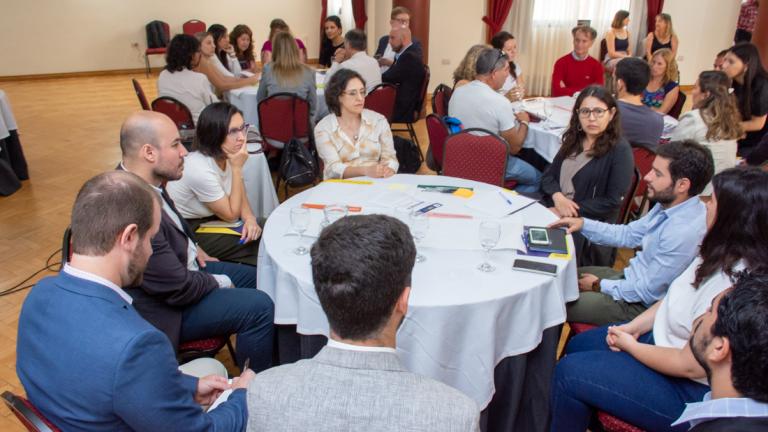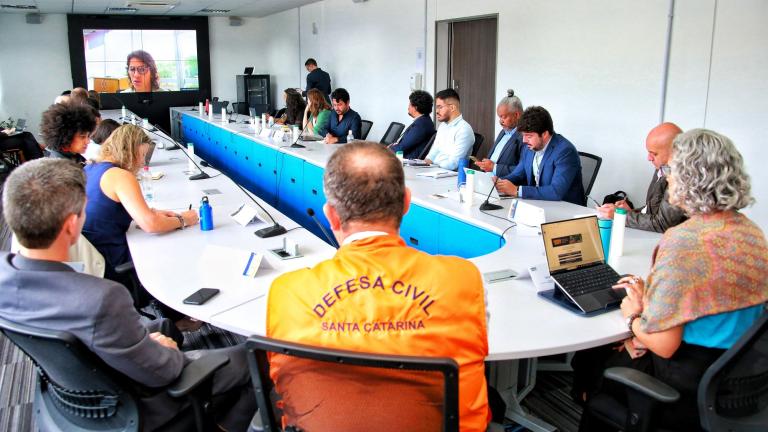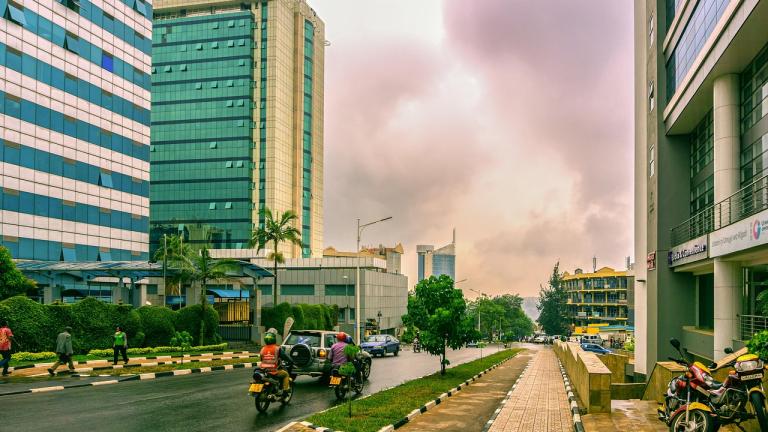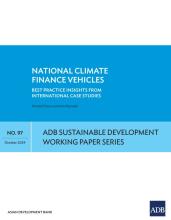Analysis
UrbanShift Advances Multilevel Governance Dialogues
These dialogues have taken place across seven UrbanShift countries to advance collaboration and alignment across all levels of government.
By Karishma Asarpota and Saheel Ahmed (ICLEI - Local Governments for Sustainability)
Imagine a city where floodwaters no longer displace families, green corridors restore biodiversity, clean energy powers homes and businesses, and local leaders collaborate with national policymakers to build a sustainable, inclusive future. As cities expand rapidly, they face both opportunities and challenges: Climate change, resource management, and social inequalities are testing urban resilience. Yet, through collaboration, innovation, and strategic governance, solutions are taking shape.
This vision drives the UrbanShift National-Local Dialogues: A platform where city planners, environmental experts, and policymakers tackle pressing urban challenges.
Five UrbanShift countries - Rwanda, Morocco, Sierra Leone, Brazil, and Costa Rica -, have also joined the CHAMP (Coalition for High Ambition Multilevel Partnerships) initiative, launched at COP28, to strengthen national-local collaboration and accelerate climate commitments.
Multilevel governance dialogues have taken place across seven UrbanShift countries. This blog provides a snapshot of key discussions, outcomes, and the next steps cities are taking toward a more sustainable and resilient future.
Participating cities
The inaugural NLDs were conducted across seven countries, with key cities including:
- Rwanda: Kigali
- Indonesia: Jakarta, Semarang, Balikpapan, Palembang, and Bitung
- Brazil: Belém, Florianópolis, and Teresina
- Argentina: Buenos Aires, Mar del Plata, Mendoza, Salta, and Ushuaia
- China: Chengdu, Chongqing, and Ningbo
- Costa Rica: San José, Desamparados, and Alajuela
- India: Pune, Surat, Chennai, Puducherry, and Agra
Rwanda: Managing floods through collaborative action
Rwanda’s capital has made great strides in urban planning, yet heavy rains continue to challenge its infrastructure. Wetlands, which naturally absorb excess water and reduce flooding, have been impacted by rapid urban expansion, leaving some areas more vulnerable to extreme weather events.
Gathering city officials, environmental experts, and national policymakers, the first National-Local Dialogue focused on better coordination between national policies and local implementation, alongside strengthening the technical and financial capacity of local governments to manage flood risks effectively. This resulted in a Multilevel Governance Roadmap, designed to align Kigali’s flood resilience strategies with national climate priorities.
As a CHAMP endorser striving to be climate neutral by 2050, Rwanda restated the vital role of local governments in climate adaptation and mitigation in its second Multilevel Governance Dialogue. This provided a platform for local officials to deepen their understanding of the Paris Agreement and Rwanda’s climate commitments, as well as to strengthen previously identified local climate interventions contributing to the NDC 3.0 development process.

Indonesia: Advancing climate action through collaboration
Indonesia’s National-Local Dialogue focused on how its cities can grow without compromising their resilience to climate change. Across the country, in fact, cities are evolving rapidly, each with its own priorities: Semarang grapples with strengthening its water resource management, Palembang works to ease congestion through sustainable transport, Balikpapan seeks to increase energy efficiency and renewable energy sources, while Bitung and Jakarta look for better waste management solutions through circular economy models. These themes are also at the heart of the UrbanShift National Child Project in Indonesia, led by World Bank Indonesia in partnership with Bappenas.
Yet, technical solutions alone aren’t enough: Stronger governance, better coordination, and sustainable financing are needed to turn ambition into action, as reaffirmed inIndonesia’s Long-Term Low Carbon and Climate Resilience Strategy 2050 (LTS-LCCR 2050).
Brazil: Strengthening metropolitan governance
Brazil’s National-Local Dialogue focused on metropolitan governance challenges. Particularly, it dived into the uneven enforcement of the Statute of the Metropolis, which was designed to promote integrated urban planning but has left smaller cities struggling with funding gaps and weak institutional support.
Budget asymmetries and limited financial autonomy have been identified as major barriers to implementing sustainability projects, alongside the need for better coordination between local and national governments and alternative financing mechanisms, such as climate-linked municipal bonds and international climate funds. The dialogue also addressed flood resilience, a growing concern for cities vulnerable to extreme weather events. While governance challenges remain, the dialogue underscored the commitment of cities to push for inclusive and effective climate action beyond major urban hubs. For instance, the visibility of the Superintendence of Development of the Metropolitan Regions of Santa Catarina (SUDESC) increased among state-level stakeholders: Despite the recent trend of dissolving metropolitan agencies in Brazilian states, this was revoked for Santa Catarina after the dialogue.
Argentina: Overcoming barriers to climate action
The National-Local Dialogue in Argentina brought together local and national government representatives, financial institutions, and climate experts to strengthen multilevel governance and improve coordination between national and local climate policies, while addressing GHG emissions tracking, sustainable urban planning, and access to climate finance.
At the dialogue, participants spotlighted limited data-sharing, insufficient enforcement, and a lack of direct access to climate finance, largely due to centralized funding decisions. In fact, despite robust national climate policies, local governments struggle to implement urban sustainability projects because of financial and technical barriers. To address this, discussions explored alternative financing options like municipal green bonds and public-private partnerships to increase local autonomy.

China: Sponge cities and the low-carbon future
Beijing’s National-Local Dialogue discussed how Chinese cities can accelerate low-carbon development and biodiversity conservation, ensuring they have the financial and technical support needed for long-term success.
The three project cities presented their priorities. For Chengdu that is urban biodiversity, especially guaranteeing that green spaces and ecosystems remain integrated into development. Chongqing is instead exploring low-carbon transport solutions, such as expanding public transit and integrating electric mobility into the existing network. Ningbo, through the Sponge City Initiative, is prioritizing water-sensitive urban design to absorb, store, and reuse rainwater, reducing flood risks while enhancing water resource management. While each city is implementing innovative sustainability initiatives, the key challenge remains how to integrate these solutions at scale, securing financial and policy support. This conversation was deepened at the second China National-Local Dialogue, focused on urban resilience and biodiversity.
Costa Rica: The green economy
Similarly, Costa Rica’s UrbanShift National-Local Dialogue focused on scalability and financial sustainability, especially in light of the ambitious goals of the country’s National Decarbonization Plan. San José is looking to preserve green spaces as the city expands, ensuring that urban growth doesn’t come at the cost of biodiversity. Desamparados officials are trying to understand how to expand recycling programs and reduce waste without sufficient funding. Meanwhile, Alajuela’s representatives are promoting better public transit and pedestrian-friendly infrastructure, recognizing that reducing emissions starts with making sustainable transport more accessible. One common direction that emerged through the dialogue was exploring public-private partnerships and national funding mechanisms to accelerate progress.
The second National-Local Dialogue in Costa Rica was focused on implementation, by reviewing the current regulatory framework on urban flooding.
India: Funding urban transformation
India’s National-Local Dialogue highlighted two critical areas that will define its future of urban development: Transit-Oriented Development (ToD) and Green Bonds & Infrastructure Financing.
Each city brought its own angle to the discussion. Pune insisted on designing cities around metro systems instead of cars to reduce congestion and emissions. Surat advocated for river-based urban development, integrating water management with city planning. Chennai promoted nature-based solutions to enhance flood resilience, while Puducherry and Agra spotlighted stronger waste management and circular economy models. Here again, the main challenge was how to finance large-scale urban sustainability projects with limited resources. Indeed, India needs $6 trillion over the next 50 years to meet its urban infrastructure needs, yet much of this investment still relies on government funding, limiting city autonomy.
The emerging consensus from the dialogue pointed to financial innovation, greater use of green bonds, and municipal financing to attract private capital for urban resilience projects. Indian cities should align their development strategies with national climate policies, particularly on expanding sustainable infrastructure, improving climate adaptation measures, and securing long-term investment. Such a growing collaboration between local and national stakeholders would lead India’s cities toward a future where urban expansion and sustainability go hand in hand.

As the UrbanShift National-Local Dialogues conclude, city leaders leave with a renewed sense of responsibility and urgency. From Kigali to Pune, a common understanding has emerged: Cities are at the forefront of climate change, and their actions today will define the future. Moving from plans to implementation - whether restoring wetlands in Rwanda, advancing circular economy efforts in Costa Rica, or scaling sponge cities in China - requires more than ambition. It demands aligned policies, adequate financing, and strong political will. With growing momentum through the CHAMP initiative, UrbanShift continues to support cities in turning climate commitments into tangible, equitable outcomes.

Argentina’s Road to 2030: Collaborative Climate Action
Argentina's first UrbanShift National Local Dialogue emphasized collaborative climate action, uniting national and local governments to promote sustainable urban development, align with 2030 targets, and enhance governance and financing.

Integrated Planning and Multilevel Governance: Insights from the UrbanShift National-Local Dialogue in Brazil
The UrbanShift Brazil National-Local Dialogue emphasized the critical role of integrated urban planning and multilevel governance in addressing climate challenges and fostering sustainable development across Brazil’s rapidly growing cities.

Rwanda Second Multilevel Governance Dialogue - Local Government Consultation on NDC 3.0 Development
This dialogue will strengthen local government involvement in shaping and implementing the country’s NDC 3.0, fostering national-local collaboration for ambitious climate action.

National Climate Finance Vehicles: Best Practice Insights from International Case Studies
The report presents a model design framework and readiness criteria for clarifying the key factors supporting effective operation and achieving prioritized climate outcomes and sustainable development.

